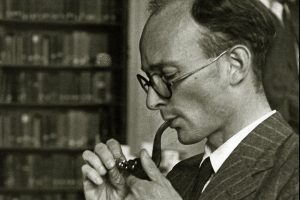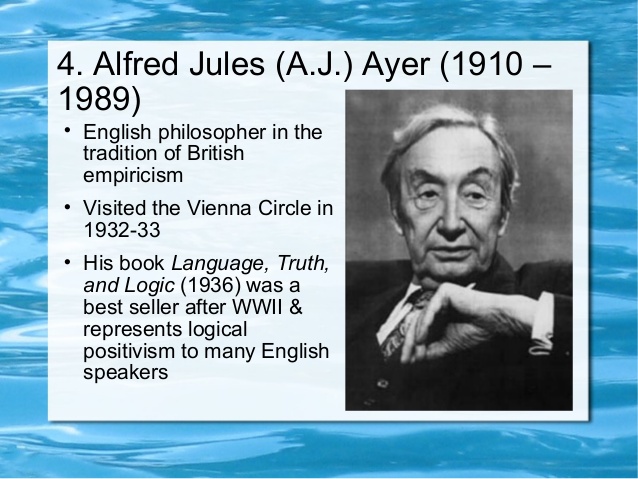 J. L. Austin
J. L. Austin
Apart from Wittgenstein, the major proponent of linguistic philosophy was John Langshaw Austin (1911-1960). Shortly after the death of Wittgenstein, Austin became the leading philosopher at Oxford University during the 1950s. He believed that analysis of the use of language is the basic concern of philosophy. One of his innovative concepts was “speech act,” denoting the factor of speech as behaviour. The title of his book How to Do Things with Words (1962) is a very graphic indicator of his format. His Philosophical Papers (1961) is also relevant.
Austin gained a classical scholarship at Balliol College. His linguistic training as a classicist apparently influenced his later career, in which his aim was to investigate and index commonly employed grammatical constructions. One of his better known emphases was the speech act that he called “performative utterances,” such as promising, congratulating, or apologising. These he viewed as serving a purpose that does not imply any direct representation of reality. Those utterances can therefore never be true or false, only relatively successful or unsuccessful. Indeed, most other utterances were also not regarded by Austin as being truth-evaluable.
How words are used, in ordinary speech, is surely a relevant subject of enquiry. However, if that endeavour becomes totally dominant in philosophy, losses can offset the gains. There are counter-views to the linguistic paradigm.
The truth or falsity of utterances becomes pressing in the contemporary world. Ordinary speech of the 1950s was superior to the demise of diction fifty years later, facilitated by decadent media. Four letter words, and one letter words, are now the extent of literacy in some sectors. Even the BBC can now do with reminding, e.g., that the vogues for slang and abuse in common language are eroding the best descriptive English. For instance, the word you now too frequently becomes u. Conceptual density has proportionately attenuated. The contemporary mindface is too often one of falsity and superficiality.

Austin acknowledged the influence of G. E. Moore’s commonsense philosophy rather than Wittgenstein. However, the Oxford philosopher Alfred J. Ayer described Austin’s blanket linguistic approach as arid. Ayer had early formed an enthusiasm for logical positivism, associated with the Vienna Circle, which he visited as a guest. His book Language, Truth, and Logic (1936) was influential in the spread of logical positivism, an outlook succeeded by linguistic philosophy. Ayer was also a follower of Bertrand Russell, who expressed aversion to linguistic analysis after himself initiating that trend. Ayer’s respect for the Cambridge tradition was commemorated in his Russell and Moore: The Analytical Heritage (1971).
Sir Alfred Ayer was Wykeham Professor of Logic at Oxford from 1959 to 1978. He is sometimes identified as a partisan of David Hume (Ayer 1980). Here Ayer closely follows basic arguments of Hume, and in such a manner as to indicate his sense of empathy. Despite his popularity with a public readership, Ayer lost to Wittgenstein and Austin in the primacy of influence upon academic colleagues at Oxford and Cambridge. The reason for this has been critically suggested in terms of: “Ayer had remained faithful to Russell, if anything excessively so, but never had any original ideas” (Magee 1998:380). Cf. Graham Macdonald, “Alfred Jules Ayer,” Stanford Encyclopedia of Philosophy.
Ayer’s reputation for atheism is accompanied by his disclosure of a near death experience, which appears to have strongly impressed him. The relevant account is not typical of logical positivism. This experience did not alter Ayer’s atheistic outlook, but did evoke from him reflections, including the possibility that consciousness can continue after death.
Another Oxford luminary was Gilbert Ryle (1900-1976), author of a provocative work entitled The Concept of Mind (1949). That thesis of the “ghost in the machine” argued strongly against Cartesian and related concepts of the independent nature of mind from the body; in the Ryle format, mental processes are not at all distinct from bodily actions.
“It is not surprising that Gilbert Ryle’s ‘deliberate abusiveness’ towards ‘the dogma of the Ghost in the Machine’ should have been forecast by Ryle himself as being in line for the accusation of a behaviourist approach” (Shepherd 1991:129).
Transiting from Husserl and Heidegger, Professor Ryle became “the John the Baptist of linguistic analysis” (Magee 1998:381). Professor Magee had the advantage of personal encounters with Ryle, so his comments cannot easily be dismissed. Ryle came under the influence of Wittgenstein, a factor “which continued even after Ryle came actively to dislike Wittgenstein” (ibid:382).
Furthermore, Ryle’s controversial book is described by the critical Oxonian in terms of “not only the central thesis but also what came to be the best known of the subsidiary theses come straight out of Schopenhauer, while all the time Ryle himself genuinely believed he was putting forward his own ideas” (ibid). Ryle is here said to have understood this factor of derivation after publication, and after being informed accordingly. Cf. Julia Tanney, “Gilbert Ryle” (2009), Stanford Encyclopedia of Philosophy, seeking “to raise the possibility that his [Ryle’s] work has been widely misunderstood.”
Ryle was eclipsed by the prominence of Austin, whose works were published posthumously. Ryle is said to have resented Austin as a consequence (Magee 1998:383). Events at Oxford included another ideological friction; Ryle is reported to have blocked the appearance of Karl Popper in an Oxford role of professorship (ibid:89). Sir Karl (who taught at London University) was apparently feared by some prestigious rival contemporaries for his critical talents, manifesting in various books now famous. Popper had a much closer association with the sciences than some of his rivals.
Bryan Magee (1930-2019) was a dissenter from the Oxford tradition. He expressed the controversial conclusion, in relation to the period under discussion, that “except for Popper’s their work [that of British analytical philosophers after Russell and Moore] constituted a bankrupt tradition” (Magee 1998:380). This is considered too strong a statement by some other academics.
Bibliography
Austin, J. L., Philosophical Papers, eds., J. O. Urmson and G. J. Warnock (Oxford University Press, 1961; third edn, 1979).
——–Sense and Sensibilia, ed. G. J. Warnock (Oxford University Press, 1962).
——–How to Do Things with Words: The William James Lectures delivered at Harvard University in 1955 (1962; second edn, Harvard University Press, 1975).
Ayer, Alfred J., Hume (Oxford University Press, 1980).
Gustafsson, Martin, and Richard Sorli, eds., The Philosophy of J. L. Austin (Oxford University Press, 2011).
Magee, Bryan, Confessions of a Philosopher (London: Phoenix, 1998).
Ryle, Gilbert, The Concept of Mind (London: Hutchinson, 1949).
Shepherd, Kevin R. D., Meaning in Anthropos (Cambridge: Anthropographia, 1991).
Kevin R. D. Shepherd
December 13th 2009 (slightly modified December 2018)
ENTRY no. 5
Copyright © 2018 Kevin R.D. Shepherd. All Rights Reserved.

